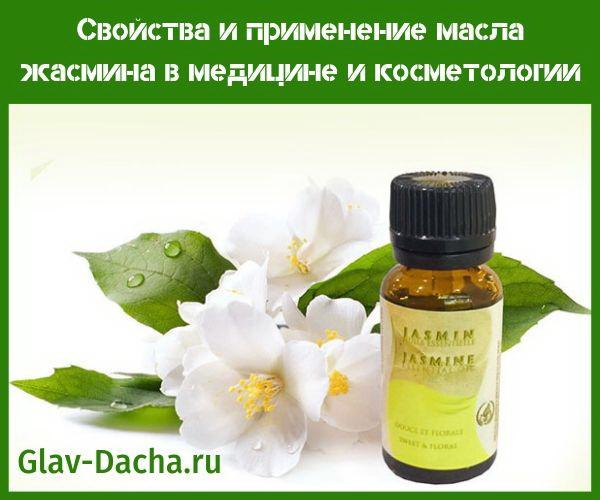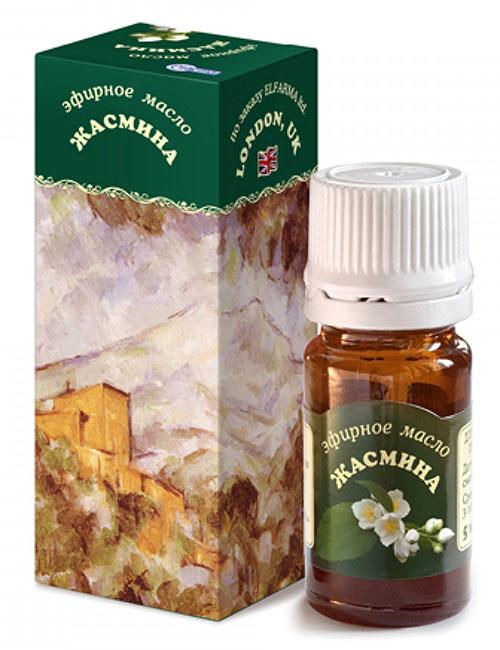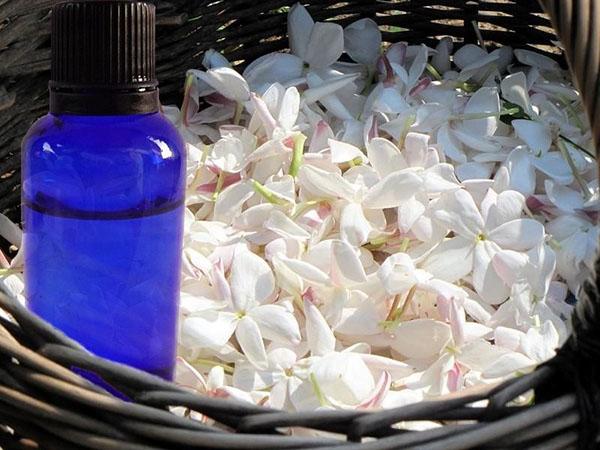Properties and applications of jasmine oil in medicine and cosmetology
 The jasmine flower is called the queen of the night for its exquisite fragrance, which is stronger after midnight. The therapeutic properties and use of jasmine oil as an aphrodisiac are known. A very intense floral scent works on the emotional and physical levels: it soothes, lifts the mood, evokes a feeling of confidence, euphoria.
The jasmine flower is called the queen of the night for its exquisite fragrance, which is stronger after midnight. The therapeutic properties and use of jasmine oil as an aphrodisiac are known. A very intense floral scent works on the emotional and physical levels: it soothes, lifts the mood, evokes a feeling of confidence, euphoria.
Essential oil characteristics

The petals are not subjected to steam distillation, but are extracted with n-hexane. For the production of 1 liter of absolute, about 1000 kg or about 8 million flowers are needed. The most valuable raw materials are obtained in the foothills of the Himalayas, Kashmir, and southern China. Jasmine is grown in Egypt, Spain, Portugal and France.
 Jasminum officinale and J. grandiflorum flowers are harvested by hand at night or early in the morning, before the sun rises. The petals have a strong aroma at this time of day, due to the increased content of volatile substances. The properties and uses of jasmine essential oil depend on the richness of the ingredients.
Jasminum officinale and J. grandiflorum flowers are harvested by hand at night or early in the morning, before the sun rises. The petals have a strong aroma at this time of day, due to the increased content of volatile substances. The properties and uses of jasmine essential oil depend on the richness of the ingredients.
Fragrant liquid jasmine oil is a universal healer of body and soul.
Important biologically active ingredients:
- jasmon is a terpenoid making up only 5% of the total volume of the absolute;
- benzyl acetate - 18-28%;
- benzyl benzoate (14-21%);
- linalool (3-8%);
- isophytol (3-6%);
- phytol (6-12%;
- squalene (2-6%).
The main properties and uses of jasmine oil also depend on the content of indole, geraniol, nerol, vanillin, eugenol. Many components have an antiseptic, antibacterial, fungicidal effect.
Psychological effect
 The flower was originally brought from the north of India, where it has been used as an aphrodisiac for many centuries. Jasmine essential oil has a sensually soft, sweet, exotic floral scent. Scientists have found that the remedy stimulates the production of the hormone of happiness - endorphin, which is responsible for the appearance of positive emotions. Low hormone levels are associated with depressive sensations, mood swings.
The flower was originally brought from the north of India, where it has been used as an aphrodisiac for many centuries. Jasmine essential oil has a sensually soft, sweet, exotic floral scent. Scientists have found that the remedy stimulates the production of the hormone of happiness - endorphin, which is responsible for the appearance of positive emotions. Low hormone levels are associated with depressive sensations, mood swings.
For a sensual massage, just mix 2 drops of jasmine oil and 50 ml of base oil.
Seductive aroma counteracts despondency, depression. The smell helps to get rid of the burden of negative emotions, anxiety and nervous tension, and provides a restful sleep. Biochemists have found that jasmine oil acts on the same receptors as benzodiazepines (tranquilizers), barbiturates. At the same time, the remedy reveals sensuality, increases libido.
Therapeutic effect
 The amount of physiologically active esters in jasmine oil is high. This is the reason for the properties and use of jasmine oil for the symptoms of various diseases.
The amount of physiologically active esters in jasmine oil is high. This is the reason for the properties and use of jasmine oil for the symptoms of various diseases.
Jasmine contains hormone-like substances that act like the body's own hormones. The use of jasmine oil for gynecological problems is based on this property.
Jasmine oil:
- has an antispasmodic effect;
- helps to reduce the intensity of menstrual cramps;
- relieves symptoms of menopause;
- relieves headache.
Jasmine is used to massage the abdomen and lower back. A few drops of essence are added to the carrier oil, for example sweet almonds... If nervous exhaustion occurs, depression develops, then a mixture for an aroma lamp is prepared from 3 drops of jasmine, 2 drops of iris oils and 3 drops of bergamot.
Studies have proven the positive effects of jasmine on the nervous system. With various methods of application - inhaling the vapors of an aroma lamp, rubbing it into the skin - heart rate, blood pressure, stress response, breathing are normalized.
Properties and application of jasmine oil for skin, hair
 The absolute is suitable for dry, oily, inflamed and irritated skin. The oil promotes cell renewal, strengthens tissues. The product has pronounced soothing and antiseptic properties. The essential oil is added to creams, face masks.
The absolute is suitable for dry, oily, inflamed and irritated skin. The oil promotes cell renewal, strengthens tissues. The product has pronounced soothing and antiseptic properties. The essential oil is added to creams, face masks.
The resulting compositions:
- have an antibacterial effect;
- help get rid of acne, acne and other inflammatory diseases of the skin.
Apply jasmine oil for the face with fading, sluggish, aging skin. The product fights wrinkles as it provides better blood supply to the dermis. Enhanced skin nutrition contributes to increased tone, rapid cell division and rejuvenation.
Jasmine oil is traditionally used to treat brittle, dry hair. Jasmon and other ingredients penetrate the roots and stem, strengthen and restore hair.
Thanks to the application of jasmine oil to the hair, they become elastic and silky again.
Precautions
 Jasmine oil is used externally. The fragrant liquid mixed with the base composition has a mild effect on the skin. However, do not overdose, as irritation may occur.
Jasmine oil is used externally. The fragrant liquid mixed with the base composition has a mild effect on the skin. However, do not overdose, as irritation may occur.
Jasmine essential oil is not intended to be taken orally.
A sensitivity test is recommended before first use. A drop of the composition is applied to the inner fold of the elbow or to the skin behind the ear. If you are allergic to jasmine, then within 15-60 minutes redness, blisters, itching will appear.
Jasmine oil has been used since ancient times to increase libido, get rid of depression, anxiety, and depression. The aromatic liquid is added to the skin and hair care product. Jasmine not only smells good, but also fights ailments. Essential oil is especially useful for women.